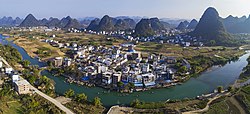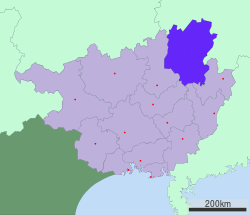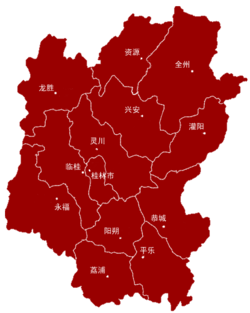Guilin
|
Guilin 桂林市 • Gveilinz Si |
|
|---|---|
| Prefecture-level city | |

Rafts sailing down the Yulong River in Yangshuo, a county of Guilin
|
|
 Location of Guilin City jurisdiction in Guangxi |
|
 Administrative divisions of Guilin |
|
| Location in China | |
| Coordinates: 25°16′N 110°17′E / 25.267°N 110.283°ECoordinates: 25°16′N 110°17′E / 25.267°N 110.283°E | |
| Country |
|
| Autonomous Region | Guangxi |
| Area | |
| • Total | 27,809 km2 (10,737 sq mi) |
| Elevation | 153 m (502 ft) |
| Population | |
| • Total | 4,747,963 |
| • Density | 170/km2 (440/sq mi) |
| Time zone | China Standard (UTC+8) |
| Postal code | 541XXX |
| Area code(s) | 0773 |
| Licence plate prefixes | 桂C for Guilin's city proper, Yangshuo, and Lingui; all others 桂H |
| Website | Guilin City |
| Guilin | |||||||||||||||||||||||

"Guilin" in Chinese characters
|
|||||||||||||||||||||||
| Chinese name | |||||||||||||||||||||||
|---|---|---|---|---|---|---|---|---|---|---|---|---|---|---|---|---|---|---|---|---|---|---|---|
| Chinese | |||||||||||||||||||||||
| Postal | Kweilin | ||||||||||||||||||||||
| Literal meaning | "Sweet Osmanthus Forest" | ||||||||||||||||||||||
|
|||||||||||||||||||||||
| Zhuang name | |||||||||||||||||||||||
| Zhuang | Gveilinz | ||||||||||||||||||||||
| 1957 orthography | Gveilinƨ | ||||||||||||||||||||||
| Transcriptions | |
|---|---|
| Standard Mandarin | |
| Hanyu Pinyin | Guìlín |
| Wade–Giles | Kui4-lin2 |
| IPA | [kwêilǐn] |
| Wu | |
| Romanization | kue去lin平 |
| Hakka | |
| Romanization | Kui-lìm |
| Yue: Cantonese | |
| Jyutping | Gwai3-lam4 |
Guilin, formerly romanized as Kweilin, is a prefecture-level city in the northeast of China's Guangxi Zhuang Autonomous Region. It is situated on the west bank of the Li River and borders Hunan to the north. Its name means "Forest of Sweet Osmanthus", owing to the large number of fragrant sweet osmanthus trees located in the city. The city has long been renowned for its scenery of karst topography and is one of China's most popular tourist destinations.
In 314 BC, a small settlement was established along the banks of the Li River.
During the Qin Dynasty's (221–207 BC) campaigns against the state of Nanyue, the first administration was set up in the area around Guilin.
In 111 BC, during the reign of Emperor Wu of the Han Dynasty, Shi An County was established, which could be regarded as the beginning of the city.
In AD 507, the town was renamed Guizhou.
Guilin prospered in the Tang and Song dynasties but remained a county. The city was also a nexus between the central government and the southwest border, and it was where regular armies were placed to guard that border. Canals were built through the city so that food supplies could be directly transported from the food-productive Yangtze plain to the farthest southwestern point of the empire.
In 1921, Guilin became one of the headquarters of the Northern Expeditionary Army led by Dr. Sun Yat-sen.
...
Wikipedia

